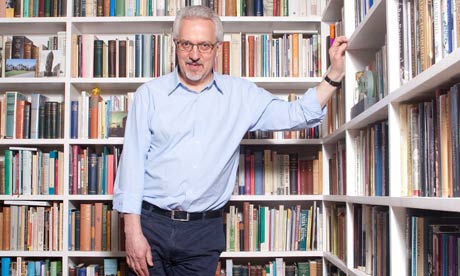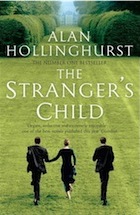
'I have an underlying confidence that I won't suffer writer's block': Alan Hollinghurst at home in Hampstead, north London last week. Photograph: Karen Robinson for the Observer
Alan Hollinghurst lives in a light and preternaturally quiet flat on Parliament Hill in north London. When his novel The Line of Beauty won the Booker prize in 2004, he spent some of his winnings on revamping it, with the result that it has a new, large sitting room with a lush view out on to a corner of Hampstead Heath. Furniture is sparse (he likes to joke that the money ran out before he could stretch to armchairs), but there are pale carpets and good paintings and – what's this? – a strange plaster relief, in an elaborate gilt frame, of the face of a (presumably long dead) young woman.
I move towards it excitedly, as if I were the first visitor ever to notice it. Beneath her profile is written her name: Daphne. Crikey. Was this a source of inspiration for Daphne Sawle, one of the most important characters in The Stranger's Child, his fifth and most recent novel? He smiles, indulgently. But, no. He bought it at auction just as he was finishing the book, by which time Daphne Sawle was every bit as real to him as this fine-boned, turn-of-the-century creature.
 Hollinghurst is all indulgent smiles today, which is just as well because I've got the jitters. The Stranger's Child, a capacious and wonderful book that begins in one suburban garden in 1913 and ends in another in 2008, has many themes. It is about love, and the passing of time; it is, too, about ambition, taste and disappointment. But more than anything, it is about the unknowability of human beings, and the misunderstandings, even the danger, associated with trying to plug the gaps in our perceptions.
Hollinghurst is all indulgent smiles today, which is just as well because I've got the jitters. The Stranger's Child, a capacious and wonderful book that begins in one suburban garden in 1913 and ends in another in 2008, has many themes. It is about love, and the passing of time; it is, too, about ambition, taste and disappointment. But more than anything, it is about the unknowability of human beings, and the misunderstandings, even the danger, associated with trying to plug the gaps in our perceptions.
Its nastiest and perhaps most memorable character is Paul Bryant, an enterprising hack reviewer and the would-be biographer of Cecil Valance, the Rupert Brooke-ish figure whose short life and long but ever-shifting literary reputation crouches at the heart of The Stranger's Child.
Bryant, like me, makes a living poking around in people's lives – and I have the impression that his creator disapproves. When he goes to stay with Daphne Sawle, for whom, when she was a girl, Cecil Valance wrote a famous poem, she likens him to a "little wire-haired ratter"; she knows, even before he has lobbed his first question, that all he is interested in, basically, is "smut". When Paul asks her if he might tape their conversation, Hollinghurst writes of the recorder's "odd insinuations of flattery and mistrust". He then lists, highly accurately, the various ways interviewees respond to it: some made awkward, as if it were an eavesdropper; others reassured to a degree that results in a kind of verbal incontinence.
I place my own tape recorder down on the small table beside us. I half expect it to explode, like a grenade. So, does he loathe Paul?
"Well, I wanted to depict him changing," he says, carefully. "And one knows how sweet young people can turn into monsters and bores." They curdle. "Yes, exactly. They curdle."
What about biography? Does he disapprove of it? "No, of course not. I love biography. But as with the novel, there's a great range between the great and the crap. A great biography is like a great novel; it has a deep sense of wisdom about life. I'm quite amused, though, and sometimes frustrated, when someone ends up with the wrong biographer.
"I'm potty about Ronald Firbank, and the first person to have access to all his papers was this woman, Miriam Benkovitz. She was in a position to do something wonderful, and she wrote this utterly inane book – and, of course, a minor literary figure is unlikely to have their life written again, so it feels like a waste. The same thing happened with Denton Welch [the writer and painter, who died in 1948]. There was this very slipshod biography by Michael De-la-Noy."
The Stranger's Child came out last year (it is published in paperback this week) to almost universal praise; the only criticism anyone seemed to be able to level at it was that it isn't The Line of Beauty. But then... controversy! The novel was left off the Booker shortlist, and thus became the focus for discontent with the prize and its supposedly lowbrow leanings; soon after, the literary agent Andrew Kidd announced that he hoped to establish a new, more serious fiction award (although, so far, nothing has yet happened on this score).
How did Hollinghurst feel about this? "I didn't say anything [at the time], and it's hard for me to say anything about it now because it sounds like I'm saying: I should have been on the shortlist."
But? "But there were a lot of books that should have been on the shortlist – Teddy [Edward St Aubyn, author of At Last] and Philip Hensher [King of the Badgers] and probably a lot of other books I haven't read, too. One can take a position about the shortlist in almost an objective way. But I also learnt, a long time ago, to be aloof from these things. You realise how arbitrary they are. It's lovely if it works out for you, but it doesn't mean anything, really, except in commercial terms.
"The Booker made me a lot of money. I didn't realise that all over the world, people will read a book just because it won the Booker prize." A delicious pause. "Not something I would do myself... But then one goes into some quite other, private region to produce a book." He gives me a knowing look. "I think the Booker can drive people quite mad. That's why it's good to be detached from it."
Read the rest here.
I move towards it excitedly, as if I were the first visitor ever to notice it. Beneath her profile is written her name: Daphne. Crikey. Was this a source of inspiration for Daphne Sawle, one of the most important characters in The Stranger's Child, his fifth and most recent novel? He smiles, indulgently. But, no. He bought it at auction just as he was finishing the book, by which time Daphne Sawle was every bit as real to him as this fine-boned, turn-of-the-century creature.
 Hollinghurst is all indulgent smiles today, which is just as well because I've got the jitters. The Stranger's Child, a capacious and wonderful book that begins in one suburban garden in 1913 and ends in another in 2008, has many themes. It is about love, and the passing of time; it is, too, about ambition, taste and disappointment. But more than anything, it is about the unknowability of human beings, and the misunderstandings, even the danger, associated with trying to plug the gaps in our perceptions.
Hollinghurst is all indulgent smiles today, which is just as well because I've got the jitters. The Stranger's Child, a capacious and wonderful book that begins in one suburban garden in 1913 and ends in another in 2008, has many themes. It is about love, and the passing of time; it is, too, about ambition, taste and disappointment. But more than anything, it is about the unknowability of human beings, and the misunderstandings, even the danger, associated with trying to plug the gaps in our perceptions.Its nastiest and perhaps most memorable character is Paul Bryant, an enterprising hack reviewer and the would-be biographer of Cecil Valance, the Rupert Brooke-ish figure whose short life and long but ever-shifting literary reputation crouches at the heart of The Stranger's Child.
Bryant, like me, makes a living poking around in people's lives – and I have the impression that his creator disapproves. When he goes to stay with Daphne Sawle, for whom, when she was a girl, Cecil Valance wrote a famous poem, she likens him to a "little wire-haired ratter"; she knows, even before he has lobbed his first question, that all he is interested in, basically, is "smut". When Paul asks her if he might tape their conversation, Hollinghurst writes of the recorder's "odd insinuations of flattery and mistrust". He then lists, highly accurately, the various ways interviewees respond to it: some made awkward, as if it were an eavesdropper; others reassured to a degree that results in a kind of verbal incontinence.
I place my own tape recorder down on the small table beside us. I half expect it to explode, like a grenade. So, does he loathe Paul?
"Well, I wanted to depict him changing," he says, carefully. "And one knows how sweet young people can turn into monsters and bores." They curdle. "Yes, exactly. They curdle."
What about biography? Does he disapprove of it? "No, of course not. I love biography. But as with the novel, there's a great range between the great and the crap. A great biography is like a great novel; it has a deep sense of wisdom about life. I'm quite amused, though, and sometimes frustrated, when someone ends up with the wrong biographer.
"I'm potty about Ronald Firbank, and the first person to have access to all his papers was this woman, Miriam Benkovitz. She was in a position to do something wonderful, and she wrote this utterly inane book – and, of course, a minor literary figure is unlikely to have their life written again, so it feels like a waste. The same thing happened with Denton Welch [the writer and painter, who died in 1948]. There was this very slipshod biography by Michael De-la-Noy."
The Stranger's Child came out last year (it is published in paperback this week) to almost universal praise; the only criticism anyone seemed to be able to level at it was that it isn't The Line of Beauty. But then... controversy! The novel was left off the Booker shortlist, and thus became the focus for discontent with the prize and its supposedly lowbrow leanings; soon after, the literary agent Andrew Kidd announced that he hoped to establish a new, more serious fiction award (although, so far, nothing has yet happened on this score).
How did Hollinghurst feel about this? "I didn't say anything [at the time], and it's hard for me to say anything about it now because it sounds like I'm saying: I should have been on the shortlist."
But? "But there were a lot of books that should have been on the shortlist – Teddy [Edward St Aubyn, author of At Last] and Philip Hensher [King of the Badgers] and probably a lot of other books I haven't read, too. One can take a position about the shortlist in almost an objective way. But I also learnt, a long time ago, to be aloof from these things. You realise how arbitrary they are. It's lovely if it works out for you, but it doesn't mean anything, really, except in commercial terms.
"The Booker made me a lot of money. I didn't realise that all over the world, people will read a book just because it won the Booker prize." A delicious pause. "Not something I would do myself... But then one goes into some quite other, private region to produce a book." He gives me a knowing look. "I think the Booker can drive people quite mad. That's why it's good to be detached from it."
Read the rest here.

No comments:
Post a Comment